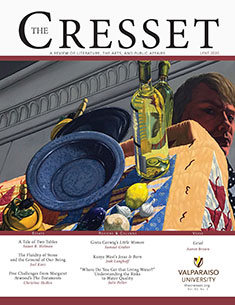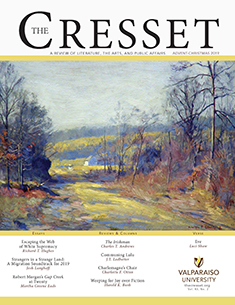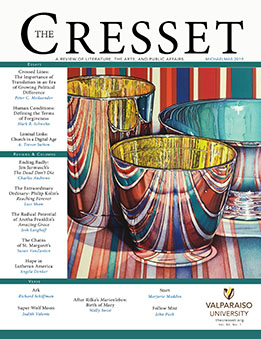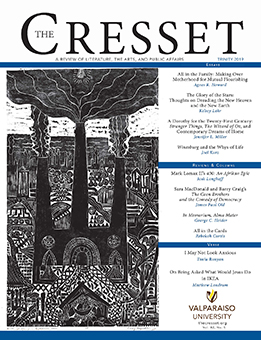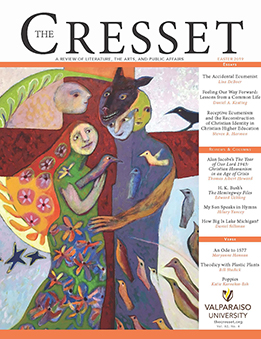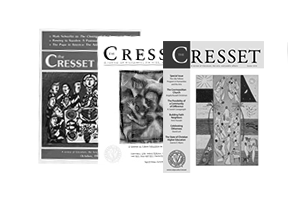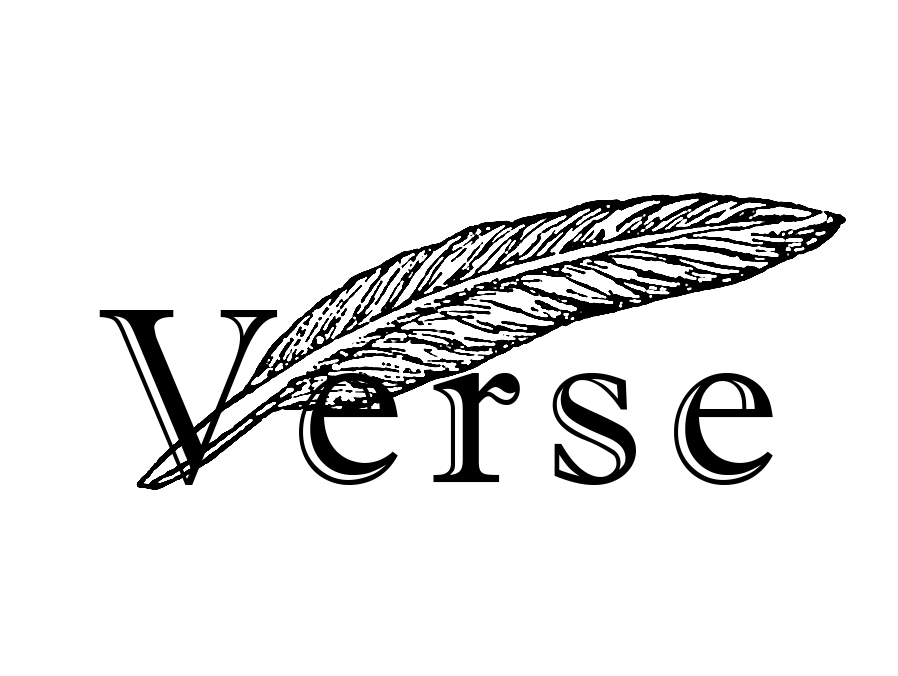on Forrest Gump
I was the victim of an allergic reaction to Forrest Gump's ontological box of chocolates. While the 300 other Megaplex patrons were sobbing uncontrollably during the credits—a reaction the film was obviously designed to produce—I was considering asking for my money back. My mother, who was with me in the theater, provided me some support with the stock phrase she uses to describe every film she wishes she hadn't wasted her time seeing. "What a piece of fluff," she said.
What I found remarkable about Forrest Gump was the reaction it produced in my 300 fellow moviegoers— and obviously in moviegoers around the country. People seem to relate to the film's nostalgic and sentimentalized version of American history. There seems to be an understanding that Forrest Gump's description of America is how it should be, and that deep inside the title character is what every American is. Mary Tyler Moore, featured in the February 13, 1995 edition of The New Yorker, is reported to have given Gump consideration for her vote for the Academy Award because Pulp Fiction disturbed her. What I'd like to ask her is why Forrest Gump wasn't disturbing.
I am particularly sensitive to sentimentalization. I find my eyes misty after watching those cotton commercials on television. I become sad when I contemplate the baseball strike— and I live in Denver, where no one even considered baseball until the Broncos started losing Superbowls like they were loose change. But Forrest Gump's brand of sentimentalization is downright frightening because its reduction of the American experience to simple nostalgia trivializes most of America's national struggles since the middle of the century.
Forrest Gump suffers most from technology's ability to alter reality. The film's gimmick is a special effect that allows filmakers to superimpose actors onto old media footage. The result is Tom Hanks as Gump "interacting" with Presidents Kennedy, Johnson, and Nixon and participating in events critical to the shape of history in late 20th century America. But where a book like Tim O'Brien's In the Lake of the Woods combines fiction with events that have actually taken place to explore and elucidate memory, Forrest Gump's combination of fact and fiction clouds and re-orders memory. It is demeaning, and when you think about it, frightening the way the special effect diminishes the emotion of the event, erases its significance altogether, or gives it an alternate meaning. Scenes from American history as potent as George Wallace standing at the schoolroom door barring black students from registering at the University of Alabama combined with Forrest's simple musings reveal the film's naivete in regards to race relations, American social history, and just about everything else. Gump's simplicity in this scene insults the movement for civil rights in America by making the struggle for racial equality look easy. All we have to do is overlook color and be nice to each other, the scene tells us, then everything will be okay. The scene stifles any national contemplation, either of the circumstances that would lead the governor of a state to refuse any of its citizens an entree into one of its institutions, or of the consequences of such an action.
If Forrest Gump is deplorable for its simplification of issues that have shaped America as a nation, it is just as deplorable for treating them as episodes in a situation comedy. The treatment of a situation as terrifying as Wallace's human blockade of the University of Alabama as a joke in one long stream of jokes is simply an attempt to give America an easy way out of a sticky situation. Our laughter during this scene erases our national guilt, acquits us of blame, and relieves us of any present or future responsibility. The altered reality of the altered media lead the way to mass denial. We want to forget that Forrest is the namesake of Nathan Bedford Forrest, founder of the Ku Klux Klan. We want to forget everything that George Wallace stood for in the 60s —or any of the implications that stance has for today— not realizing that we should be disgusted with a film that treats something as complex a social problem as US race relations with a kiss and make up attitude.
This is especially true at a time when other formerly ethnically diverse countries have collapsed in the wake of national hatred. We are meant to laugh at this scene just as we laugh at the rather tasteless scene alluding to Lyndon Johnson's appendectomy scar. This "chronicle" of late 20th century American history remembers Johnson as the good ol' boy he was, but refuses to recognize him as a major American political figure behind the Vietnam War.
As Johnson's very presence in the film indicates, Forrest Gump downplays the significance of America's foreign entanglements as thoroughly as it does the country's civil wars. The film's blatant sentimentalization of the political climate surrounding the Vietnam War is just as insulting as its reaction to racism. The shot of the war hero and the war protester embracing in a D.C. reflecting pool during the march on Washington could only be imagined in the post-Gulf War era, when we support our troops because no one wants to be blamed for the bad feelings we have left over from Vietnam. Forrest and his childhood sweetheart overcoming political difference because they have a common background is an artificial and wholly fictionalized account of the political turmoil the war caused. It is in the film to make us feel good about that part of our history without confronting the era's anger, fear, or sadness. It does the same thing that the yellow ribbons worn during the Gulf War did for us; it makes us feel good about an act of aggression against another country, it takes our minds off the fact that the troops we're supporting are killing people and being killed.
Forrest Gump also suffers from the notion that ideas are smaller than people, that the average individual can exist without ever intersecting them. Forrest drifts through the late 20th century without being effected by any of it. He visits the presidents and all he's excited about is the availability of Coca-Cola. He is injured saving his entire platoon from death in Vietnam and he is excited only because the nature of his injury allows him all the ice cream he can eat.
To explore the consequences of such a reality that severs the personal from the he political within the context and language of film, it is instructive to take a brief look at Zhang Yimou's most recent film, To Live. As Forrest Gump relies heavily on American history for theme and backdrop, To Live spans decades of China's history from before the Communist ascension through the Cultural Revolution. But unlike Forrest Gump, who at times walks through Hell and emerges unscathed, the lives of To Live's characters are constantly being upset by even the slightest of their government's ideological changes. They smile through the pain in their lives not because of their simplicity, but because they realize that acquiescence often means survival. They are made aware at every turn how ideas influence their lives, how ripples in the waters of Peking's bureaucracy cause tidal waves in their lives. The color red is an important symbol in Zhang's unusually colorless film because it is a symbol of communism and also because is it the color of blood. Zhang's characters bleed— often literally, and at times fatally— because of their relationship to ideas. Forrest Gump cleans up the blood. It exalts in the individual's triumph over ideology by embracing an ideology of its own.
Forrest Gamp's ideology is probably most apparent in his Gumpisms— the one line inspirational phrases by which he lives and which provide him a moral armor against ideas that could lead him to stray from his path. Americans probably relate to Gumpisms because, in part, we have a culture based on them. Americans have always loved one-line inspirational phrases. As Whit Stillman's film Barcelona points out, the entire American business and self-help culture depends on inspirational phrases. Benjamin Franklin, whose Autobiography reads like a blueprint for material success in America, included in his Poor Richard's Almanac single snippets of wisdom designed to make one "healthy, wealthy, and wise," as it were. We are so familiar with them as ways of guiding us through emotional distress that Saturday Night Live writers can spoof them in skits like "Stuart Smally" and "Deep Thoughts." Such phrases have paved the way for our national culture of the soundbite. Happy since Franklin to eat life in small easily digestible bits we, like Gump, allow them to define how we live our lives.
Soundbites prevent us from developing life-philosophies of our own. Ronald Reagan knew this, and throughout his presidency gloried in the sheer prevention of introspection they foster. "The Great Communicator," he realized much as Nixon and Kennedy before him did, that Americans will believe—and I choose that word carefully, relying on Cresset readers' understanding of what belief entails—what they see on television. The result of Ronald Reagan saying "God Bless America" so many times during his eight years in office is that now it seems that God blessing America has become official policy. The Reagan eighties in many ways created the environmental conditions that gave rise to Forrest Gump. Reagan's silent message to the nation that sincerity is the primary virtue resonates through Hanks' portrayal of Gump. Director Robert Zemekis' use of altered media footage takes up the alteration of reality where Reagan left off.
Mom was wrong when she called Forrest Gump a piece of fluff. If it were, it would have disappeared harmlessly into the film purgatory of the video store. Instead, America's adoption of Gump as a hero, a son, and a sage testifies to the film's power. The fluff factor in this scenario are the moviegoers who allow their senses of nostalgia to dictate their reaction to this film. Forrest Gump calls for a national unconsciousness—and that's what we should cry about.


